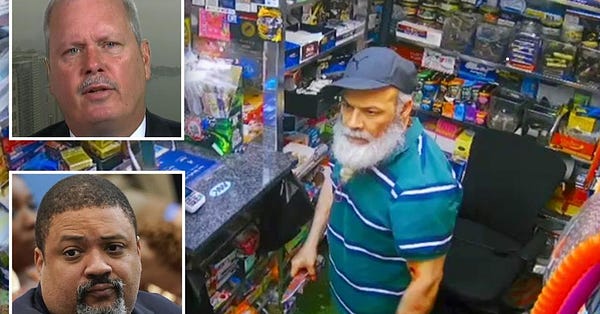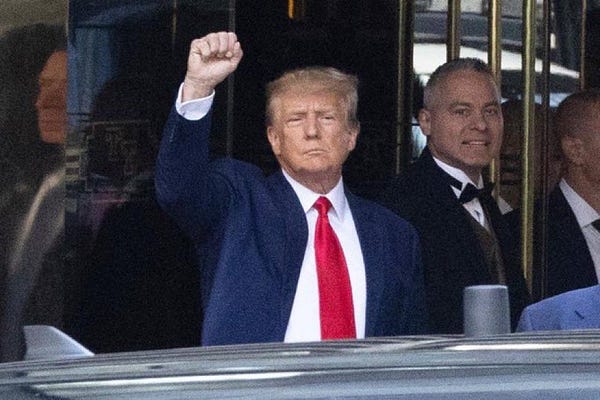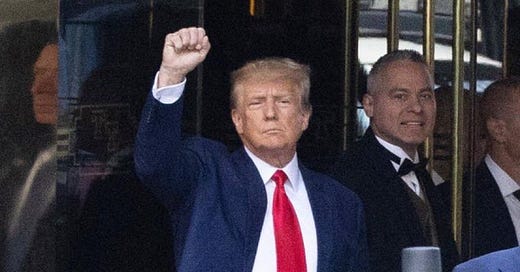Donald Trump in New York for his arraignment on Tuesday.
Donald Trump as Sherman McCoy
Donald Trump has probably never read Tom Wolfe's classic novel Bonfire of the Vanities, which is too bad, because, in a way, he's living it. In the novel, a wealthy New Yorker named Sherman McCoy is unjustly prosecuted by a local district attorney for political reasons; the district attorney's staff members call him Captain Ahab, and McCoy is is "Great White Defendant".
I say Trump probably never read the novel for few reasons. First, Trump didn't note the obvious parallel in his remarks after his arrest Tuesday, comparing the case instead to something out of the Soviet Union.

Second, Trump doesn't seem to be much of a book reader. When asked on the campaign trail in 2016 what his favorite book was, he sometimes answered All Quiet on the Western Front, a fine book, but probably one of the few that came readily to Trump's mind because he remembered it from high school. Other times Trump offered The Bible as his favorite book, with his own Art of the Deal as his second favorite. And finally, Pat Buchanan actually asked Trump if he had read Bonfire of the Vanities during a Crossfire interview in 1987, when both Bonfire of the Vanities and Trump's Art of the Deal were published. Here's how that exchange went:
Pat Buchanan: Who are your favorite authors?
Donald Trump: Well, I have a number favorite authors. I think Tom Wolfe is excellent.
Pat Buchanan: Did you read Vanity of the Bonfires [Sic]?
Donald Trump: I did not.
Tom Braden: What book are you reading now? [Crosstalk]
Donald Trump: I reading my own book again because I think it's so fantastic Tom.
So, it's likely Trump hasn't read Bonfire. Here's what he missed that's relevant to his situation now.
Demographic Change And Justice
In the novel, the McCoy is prosecuted by the Bronx district attorney, who happens to be Jewish, Abe "Captain Ahab" Weiss. The assistant DAs and police under Weiss are mostly Italian, Irish, and Jewish, but they realize that's a legacy of the Bronx's past, when it was a largely a white working class borough. In the time of the novel, it's increasingly black and Latino; the young prosecutors realize that when they're Abe Weiss's age, there will be no jobs for them there.
But in the present, Abe Weiss still has to win the votes of the black and Latino residents of the Bronx. That's the main reason he leaps at the chance to throw the book at a "Great White Defendant" like McCoy for an incident that otherwise might not be prosecuted (accidentally hitting an attempted robber with a car while fleeing from him). But another reason is a sense of guilt:
Every assistant DA in the Bronx, from the youngest Italian just out of St. John's Law School, to the oldest Irish bureau chief...shared Captain Ahab's mania for the Great White Defendant. For a start, it was not pleasant to go through life telling yourself, "What I do for a living is, I pack blacks and Latins off to jail."
Wolfe writes that the prosecutors felt uneasy about this, but they also realized that nearly all of these arrestees were guilty.
Alvin Bragg And Abe Weiss
The Manhattan DA prosecuting Donald Trump has one thing in common with Wolfe's Bronx DA Abe Weiss: both go after a Great White Defendant for political reasons. But at least Weiss also prosecutes actual criminals. Bragg is worse in a way that even the prophetic Wolfe didn't anticipate: the only blacks and Latinos Bragg zealously prosecutes are ones who have defended themselves against violent criminals, for example the Dominican bodega owner Jose Alba,


And the African parking garage worker Moussa Diarra.


(After a public outcry, Bragg backed off charging Diarra, who wouldn't have gotten shot had his attacker not been free despite twenty prior arrests.).
The New York (and America) That Used To Be
It would be fascinating to hear Trump talk about Bonfire of the Vanities had he read it. As a child of the Outer Boroughs, would he relate to its depiction of the Bronx's faded glory? Wolfe's assistant DA Larry Kramer sees it on his way to work:
He looked up--and for an instant he could see the Bronx in all its glory. At the top of the hill, where 161st Street crossed the Grand Concourse, the sun had broken through and had lit up the limestone face of the Concourse Plaza Hotel. From this distance it could still pas for a European resort hotel from the 1920s. The Yankee ballplayers used to live there during the season, the ones who could afford it, the stars. He also pictured them living in big suites. Joe DiMaggio, Babe Ruth, Lou Gehrig... Up there at the top of the hill, 161st Street and the Grand Concourse had been the summit of the Jewish dream, of the new Canaan, the new Jewish Borough of New York, the Bronx! Kramer's father had grown up seventeen blocks from here, on 178th street--and he had dreamed of nothing in this world more glorious than having an apartment...someday...in one of these grand buildings on the summit, on the Grand Concourse. They had created the Grand Concourse as the Park Avenue of the Bronx, except the new land of Canaan was gong to do it better. The Concourse was wider than Park Avenue, and it had been more lushly landscaped--and there you and another grim joke. Did you want an apartment on the Concourse? Today you could have your pick. The Grand Hotel of the Jewish dream was now a welfare hotel, and the Bronx, the Promised Land, was 70 percent Black and Puerto Rican.
Surely, Trump, running again on his promise to Make America Great Again, would grok that sense of loss, but it would be tempered by Trump's relentless, Norman Vincent Peale optimism.
The Raised Fist
Had Trump read Bonfire, he would have realized that he and the Sherman McCoy both shared the same gesture of defiance. McCoy, on trial for his life, asks his wife Judy if she remembers the raised fist salute he'd give her on his way to work when they were first married.


McCoy's wife says she remembers:
"You remember why?"
"I guess so."
"It was supposed to say that yes, I was going to work on Wall Street, but my heart and soul would never belong to it. I would use it and rebel and break with it. You remember all that?"
Judy said nothing
"I know it didn't work out that way", he went on, "but I remember what a lovely feeling it was. Don't you?"
Again silence.
"Well, now, I've broken with Wall Street. Or Wall Street's broken with me. I know it's not the same thing, but in an odd way I feel liberated."
It's hopeful note in an otherwise grim denouement for Sherman McCoy. We'll see whether Trump, having been liberated in a similar sense, will have a less grim final act.
A Quick Update
In a story Sherman McCoy might have appreciated, a stock spiked 171% on Monday because it had "AI" in its name. I mentioned it in a ZeroHedge post that day and elaborated on my trading Substack, saying readers might want to consider shorting it if their brokerage had shares available to short (mine didn't).
That stock tanked 32.41% on Tuesday, and is down another 5% and change in premarket trading Wednesday as I type this.








TIK TOK
https://bilbobitch.substack.com/p/why-is-wash-dc-so-butt-hurt-about
“Probably”